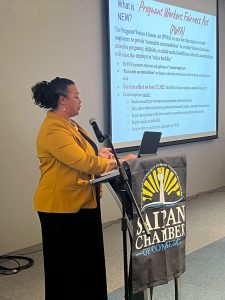Labor: Pregnant Workers Fairness Act takes effect on June 27

CNMI Department of Labor Secretary Leila Staffler served as one of the guest speakers of the Saipan Chamber of Commerce’s monthly membership meeting last June 3 at Kensington Hotel. (MARK RABAGO)
CNMI Department of Labor Secretary Leila Staffler said the Pregnant Workers Fairness Act will take effect in the CNMI starting on June 27.
Serving as guest speaker of the Saipan Chamber of Commerce’s monthly membership meeting last June 3 at Kensington Hotel, Staffler said the new law will eliminate discrimination and ensure workplace accommodations for workers with known limitations related to pregnancy, childbirth, or a related medical condition.
The Pregnant Workers Fairness Act applies to employers having 15 or more employees. It was originally a stand-alone bill first introduced in 2012, but was later included as Division II of the Consolidated Appropriations Act, 2023.
It was passed by Congress last Dec. 27 and signed into law by President Joe Biden last Dec. 29.
Staffler said under the Pregnant Workers Fairness Act, “a covered employer cannot require an employee to accept an accommodation without a discussion; may not deny a job or other employment opportunities because you require reasonable accommodations; require an employee to take leave if another reasonable accommodation can be provided; retaliate against an individual; and interfere with any individual right under the Pregnant Workers Fairness Act.”
Staffler said reasonable accommodations would be considered changes to the work environment or the way things are usually done at work.
“Examples include the ability to sit or drink water, receive closer parking, have flexible hours, receive appropriately sized uniform and safely apparel, receive additional additional break time to use the bathroom and rest, take leave or time off to recover from childbirth, and be excused from strenuous activities that involve exposure from compounds not safe for pregnant women,” she said.
Updated website
Aside from sharing details of the Pregnant Workers Fairness Act, Staffler also said Labor has finally updated its website (marianaslabor.net).
“We have given it a new look. So if you go on there, you’ll see that some of the different parts of the menu have changed. We’re trying to streamline it. It was redundant and old and had some 2008 data there. It’s gone now and these were stuff before the Consolidated National Resources Act was in place and so we updated the page since then, finally,” she said.
A nice feature of the upgraded website are the various links for job openings and Staffler encourages all companies in the CNMI to post their job openings at Labor’s website.
“I would love to do that to every business in the CNMI because to be honest, not everybody posts their jobs with us. I mean, I know that it’s a service that’s available, but it is not exactly required unless you are trying to hire a foreign worker.”
And for companies that employ or are planning to hire CNMI-Only Workers, Staffler said Labor is more than welcome to help them fulfill the job posting which is required under the law.
“If you are trying to hire a foreign worker you are required to use our system. So make sure you’re getting that. But also if you are not sure if you’re planning to hire a CW worker, but you would like to post on our website, please do or if you would like to give us the link that you would like our page to link to directly for you. Send that to that email up there (mlagultodol@gmail.com) on the wall.”
In a perfect world, Labor wants all CNMI job postings funneled through their website.
“We would love to link to your job posting because a lot of people out in the community assume that the Department of Labor has all the job postings. Unfortunately, that’s just not true. I wish it were and I would like to work toward that…We really want to make it a one-stop shop for job openings because there’s a lot of people who are looking for jobs and a lot of people who need employees. So let us be that middle manager for you,” added Staffler.
Remote work opportunities
Staffler also envisions Labor as a conduit to help CNMI workers get remote work so they don’t have to move to the U.S. mainland for better-paying jobs.
“You may or may not think it’s a good thing, but I really see that our world is changing into remote work, or we really need to empower our people to know what that is and how to do it. Also to know what options are out there. We want to increase links to remote work options even for people who might only have a high school diploma. There are remote jobs out there that can meet your educational and skill levels.”
To this end, Labor is planning to work closely with Glenn Hunter, special assistant for Broadband Policy and Development Program, to improve the CNMI’s internet connectivity with the rest of the world to realize the potential of remote work in the Commonwealth.
“I know you know a few people in our community that have done that. Those who work for big internet companies have come home to be with their families and their kids are playing with their cousins and they still get to work from home. We’d like to see our people return to that but also the people who are here to see if possibly they can have access to that. We want to provide different training for people to learn [remote work] and that’s something we’d be interested in. It’s not something we offer yet but if you’re a training provider that is looking to do that I want to talk to you,” said Staffler.























